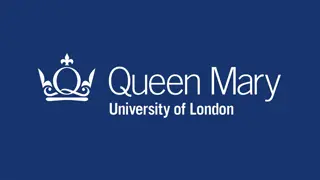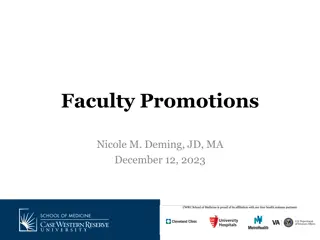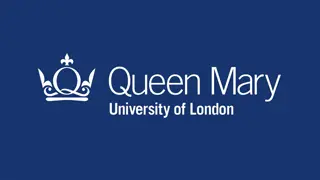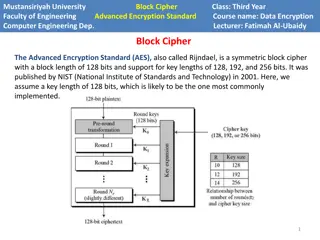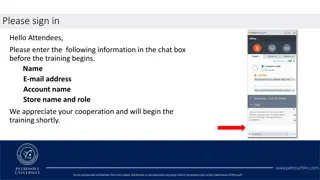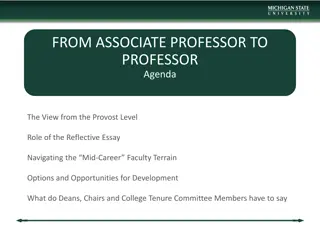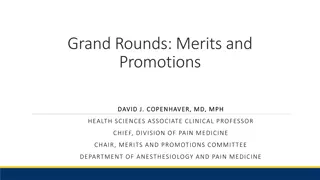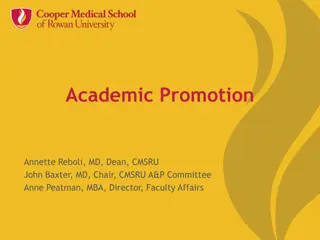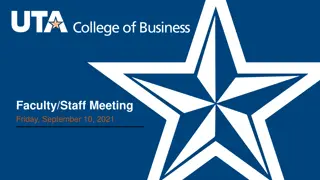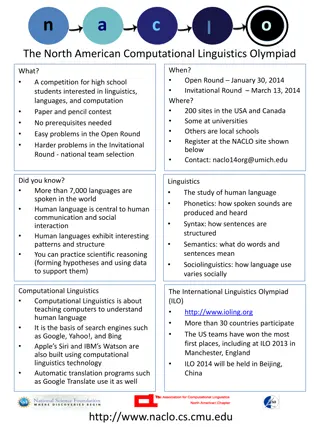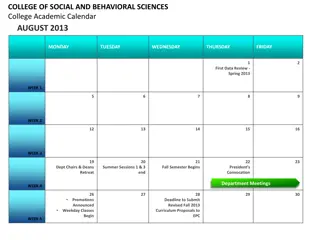Academic Promotions Round 2024
This briefing session provides an overview of the academic promotions process for the 2024 round at Queen Mary University, emphasizing the framework for career development, evidence-based application, quality over quantity, workload allocation, fairness, and consistency. It highlights the key aspects including the promotions process, eligibility criteria, evidence alignment, decision-making responsibilities, training and development needs, and ensuring fairness through consistent panel composition and mandatory briefing sessions.
Download Presentation

Please find below an Image/Link to download the presentation.
The content on the website is provided AS IS for your information and personal use only. It may not be sold, licensed, or shared on other websites without obtaining consent from the author.If you encounter any issues during the download, it is possible that the publisher has removed the file from their server.
You are allowed to download the files provided on this website for personal or commercial use, subject to the condition that they are used lawfully. All files are the property of their respective owners.
The content on the website is provided AS IS for your information and personal use only. It may not be sold, licensed, or shared on other websites without obtaining consent from the author.
E N D
Presentation Transcript
Academic Promotions Round 2024 Briefing session for panel members Tim Hubbard, Head of Reward and Benefits
Purpose and Agenda Purpose Agenda Provide a run through of the academic promotion process and documentation Overview of the promotions process, context and documentation Clarify changes made for the 2024 promotion round The Academic Careers Framework and application forms/guidance Ensure a consistent approach across all 3 Faculties and all Schools/Institutes The School/Institute Promotion Group and documentation
The Promotions Process at QM Enabling a framework for career development Self-application there is no requirement for prior approval or nomination Evidence and alignment applicants provide evidence of their contribution at the level they are applying for, in line with the Academic Careers Framework and Queen Mary Values Decision-making responsibility for decisions on whether an applicant meets the criteria is delegated to promotion panels Emphasis on quality and impact of contribution, not quantity Use of appropriate metrics to measure quality/impact
Promotions in context Workload allocation Appropriate metrics and norms Appraisal Manager s feedback Training and development needs Self-assessment and reflection on achievements and trajectory Guidance and forms available to all
Ensuring consistency and fairness Consistent promotion panel composition across all Schools/Institutes Mandatory briefing sessions for all promotion panel members on the promotion guidelines and criteria; inclusion e-learning also required Briefing sessions offered to all academic staff who wish to apply Schools sent lists of all academic staff eligible for promotion Explicit guidance on how to handle issues such as conflicts of interest, and personal circumstances EDI statistics recorded, reported and reviewed by Faculty and University-level panels HR specialists attend Faculty and University Panels to assist, guide and support
Eligibility Lecturers, Senior Lecturers and Readers are eligible to apply for promotion if they meet the following criteria: One year s continuous employment on 31 December 2023; Successfully completed the previous academic year s annual appraisal/probationary review. Guidelines and application form are at: http://hr.qmul.ac.uk/procedures/promotion/ Deadline for applications - Tuesday 31 January 2024
Promotion documentation for 2024 The Academic Careers Framework, Forms and Guidance for Applicants are largely unchanged for this round relevant points/changes summarised below Education: this is a compulsory area of contribution for all applicants note the importance of educational impact and link to student experience and KPIs Citizenship & Inclusion: this is a compulsory area of contribution note the importance of demonstrating the Values and role-modelling leadership behaviour Research: the emphasis is on the quality and impact of the research output on society, the economy, industry, government or public policy Scholarship: the criteria have recently been reviewed and updated by Queen Mary Academy to make the requirements clearer and more consistent Professional Practice: there is an emphasis on external influence, impact and the enhancement of Queen Mary s reputation in the relevant professional field Enterprise & External Engagement: there is an emphasis on collaboration, initiatives and impact e.g. knowledge exchange
Academic Careers Framework is used in: Discussing career trajectories/plans Identifying development opportunities Preparing for appraisals/annual reviews Preparing academic promotion applications Assessments of promotion applications Professorial Review individual submissions Demonstrating excellence Demonstrating excellence in development, delivery in development, delivery and leadership and leadership
Evidence of impact and Evidence of impact and excellence in development, excellence in development, delivery and leadership in delivery and leadership in a minimum of 3 areas: a minimum of 3 areas: Education* Citizenship & Inclusion* Research** Scholarship** Professional Practice** Enterprise & External Engagement * Compulsory areas of contribution ** Must be included according to career path
Applicant briefings Applicant briefing session included: Building a case for promotion Tips in preparing a case Completing the application form Personal circumstances Next 6 slides cover these aspects
Getting Started Prepare early: Discuss your readiness for promotion with your Head of School, Academic Lead for Staff Development, or mentor; listen carefully to their feedback and advice Review the documentation: The Promotion Guidelines, the Academic Careers Framework and the Application Form Consider your role: T&R, T&S or T&PP Make a list: Write down everything you think may be relevant; discuss with a colleague for ideas; use recent probation/appraisal documentation; sift the most compelling points which best demonstrate your contribution and impact
Building a case Focus on evidence: for example, leadership roles you have undertaken, student feedback on your teaching, publications, grant applications and funding Align to the Framework: identify which Areas of contribution your evidence is aligned to; ensure you can demonstrate excellence in delivery, development and leadership (using the examples/criteria shown in the Academic Careers Framework) Follow the guidelines: Read them carefully and ensure you complete all sections of the application form. Gaps in information, CVs in an incorrect format, or not providing evidence in sufficient Areas of contribution would result in your application being rejected.
Completing the Application form: Hints and tips Contractual designation: Select your current pathway; it s not possible to change pathways via the academic promotions process. Description of contribution: Three strong narratives present better than six vague ones; be concise and back up statements with evidence; do not exceed an average of 500 words per narrative.
Completing the Application form: Hints and tips Teaching accreditation: It is important to demonstrate a teaching accreditation, or evidence of working towards it. Applicant CV: Make sure it is submitted in the format required.
Completing the Application form: Hints and tips Mandatory training: It is important that you have completed the following mandatory training as a minimum: Introducing Inclusion Safeguarding Essentials A new box has been added before the final application sign-off.
Personal Circumstances Any personal circumstances to be taken into account may be declared in a Personal Circumstances Statement and submitted to HR when the application is made to the Head of School/Institute Director. Any information declared remains confidential and is only seen and considered by the Personal Circumstances Panel, chaired by a Vice-Principal and including an HR representative and 2 senior members of academic staff (ex-Heads of School). Personal Circumstances Panel assesses the impact on work of the circumstances. A summary of the impact is provided to Promotion Panels by HR. No details of the specific personal circumstances are provided to the Panels. The Promotion Panels will take the impact into consideration when assessing the applicant s contribution. The expectation is that Panels calibrate the usual expectations of what should have been achieved during the period affected by the circumstances. The standards and quality of contribution expected for promotion will still need to be present.
Panels and Roles School/Institute Promotion Group chaired by Head/Director Makes recommendations to faculty Applicants receive feedback Optional: Applicant response Faculty Promotion Panel chaired by Faculty VP Review the School/Institute panel process and summary outcomes (e.g. EDI stats) Considers all cases (whether supported or not) Primary decision-making body University Academic Promotions Group chaired by Principal Overview of process; EDI and other statistics Receive any additional information (e.g. references for Professor) Ratification of Faculty Panel decisions; discuss by exception as needed
School/Institute Promotion Group Chaired by the Head of School/Institute Director and include: The Deputy Head/Institute Director (or equivalents: no more than three individuals) An appropriate number of senior staff in the School/Institute proportionate to its size and management structure (typically including the Lead for Academic Development or the Academic Lead for Education and the School/Institute Manager or equivalents) Head of School/Institute Director should ensure, as best as possible, that the panel is appropriately representative and inclusive This panel will need to meet no earlier than 1 March and no later than 22 March Deadline is 10 April for Heads to submit all completed applications to HR At this meeting the Chair will need to complete the Group Meeting pro forma
Principles of the School/Institute Promotion Group Meeting Consider applications in order of seniority, beginning with applications for Senior Lecturer, followed by Reader and then Professor Form an evaluation of the case with analytical and purely factual input, together with clear evidence to support statements under each section In rare circumstances, the Head/Director can seek further information from the applicant or other staff relevant to the application Where this is required and additional information is provided, the Head/Director should seek comment/views from fellow Group members prior to completion of the final statement.
Assessment of Application (Head/Director Statement) From the group discussions, the Head/Director should formulate a statement that explains the decision. It is shared with the Group prior to the submission to enable collective agreement. This statement should make references to where the applicant has met (or not met) the standards of excellence in the Academic Careers Framework. A copy of the final statement, agreed by the Group, will be provided to the applicant by HR, to allow those who wish to respond to comments (via Applicant Response) before the Faculty Panel.
Further Information Guidelines and application form are at: http://hr.qmul.ac.uk/procedures/promotion/ Contact: rewardandbenefits@qmul.ac.uk Any questions?



